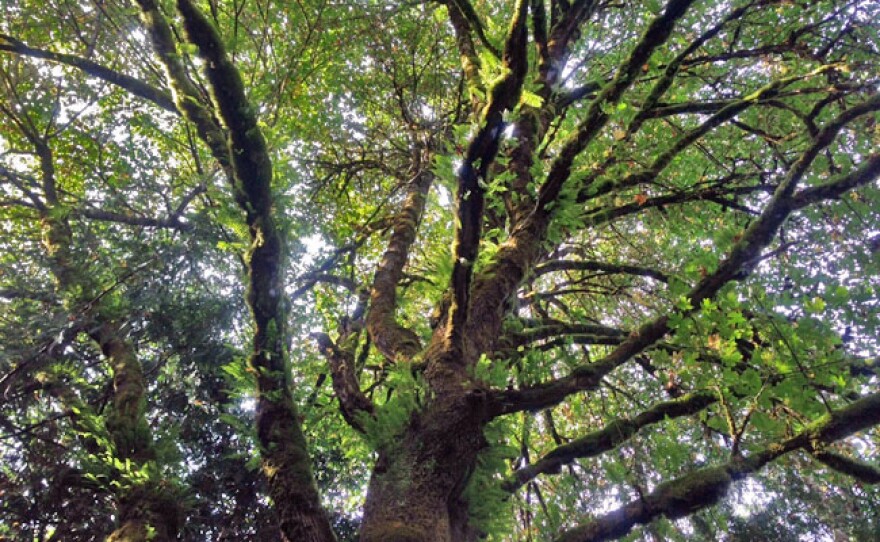U.S. guitar makers are under scrutiny these days because of the rare woods they sometimes use. One of those prized woods is found only in the Pacific Northwest.
It’s so valuable there’s a thriving black market for it. Guitar companies that use illegal wood risk federal prosecution. So they’re now developing new purchasing standards.
But at least one former insider says the industry has let the problem fester for years.
"80 to 100 years old"
State park ranger Mischa Cowles leads me down an old logging road. We’re on Harstine Island in southern Puget Sound. Last January, she took this same walk and found that someone had punched a new road through the forest. She had one, unsettling thought:
“I don’t think I’m going to find anything good at the end of this new road.”
She was right. A few hundred yards later -- in a steep, sword fern covered canyon -- she came upon the scene of a crime. A giant Big Leaf Maple tree lay in a stream bed. The tree had been felled with a chainsaw and roughly two-foot blocks of wood removed from the trunk – the telltale sign of music wood thieves.
As Cowles continued to investigate she found at least a dozen more poached maples.
“The ones that were cut down were 80 to 100 years old," she says. "The huge ones."
Beneath the bark of some of these massive old trees there’s a wavy or tiger striped grain. It looks almost holographic. Furniture and musical instrument makers prize this wood -- especially builders of electric guitars.
Instrument-grade cash crop
Carlos Santana plays a figured maple topped guitar made by Paul Reed Smith. If you have the cash, you could own one too. A top-of-the-line model will run you about $10,000.
There’s a specific type of figured maple that’s especially coveted for guitar tops. It’s called quilted maple. Reid says most, if not all, of that variety is found in the Pacific Northwest.
Reid has been a wood buyer for PRS since 1987. He says instrument grade wood is the best of the best. That makes it worth a lot of money. And like anything of value, a target for thieves. Reid says poaching music wood can actually be pretty easy money.
“There are some unscrupulous wood vendors that are going to buy stolen wood," he says. "And they’re pretty well known throughout the industry. We don’t buy from them.”
Instead, Reid says he works with a half-dozen or so vendors in Washington, Oregon and British Columbia. Vendors he regularly visits and whose owners he trusts.
"But we don’t actually require for every load of wood that we get verification that it was legitimately procured," Reid says. "I mean there has to be a certain amount of trust. I’m not going to ask these guys for every one of their sources.”
"I can’t imagine they would do that"
One of Reid’s trusted vendors is Greg Lippincott. He runs a specialty mill in Port Angeles and sells to several major guitar makers. Lippincott is acutely aware of the issue of poached wood -- especially after what happened a couple of years ago: some stolen old growth fir ended up in his mill yard.
He says, “I just don’t want that to ever happen again.”
Lippincott says he does everything he can to make sure the wood he sells is legally sourced. But unless he buys directly from a landowner or goes out to the harvest site himself, “I can’t guarantee it, no.”
For guitar makers, the issue of illegally sourced wood took on a new level of urgency in 2011. That’s when – for the second time - federal agents raided Tennessee-based Gibson Guitar. The raids targeted imported ebony and rosewood. The Gibson raids jolted the guitar industry says Mike Italiano, a lawyer in Washington, DC. After that, he helped write a set of voluntary wood-sourcing standards.
“This risk is only going to continue and therefore the pressure for more enforcement is going to go up," says Italiano. "And so the music industry helped develop the standard, it’s there for them to use.”
“This was needed 10 years ago. It’s still needed today,” insists Troy Dana, a former industry insider based in Olympia. He used to sell figured maple to guitar makers.
Dana says he tried to sound the alarm about maple theft a decade ago. He recalls drug deal-like sales in Kmart parking lots. So he proposed to form a third party certification program for figured maple. He thought it would be good for business.
“If you’re Eddie Van Halen, Carlos Santana, any number of remarkably talented, gifted players you probably want to know that there’s no chance that that figured Maple top has been a stolen top.”
But Dana says he got pushback from the industry and the idea died.
Michael Reid, the buyer for PRS Guitars, thinks things are better than they were a decade ago. Still he acknowledges there’s more his industry could do to combat the black market for figured maple.
“I don’t think anybody in our industry is buying wood that they know was stolen," says Reid. "I can’t imagine they would do that. But I think that several people in the business could be a lot more careful than they are right now.”
Recently some guitar companies began requiring paperwork for all figured maple purchases. But Reid cautions a more robust paper trail is no guarantee -- and no substitute for getting out of the office and visiting the mills and the vendors in person and often.
On the Web:
Lacey Due Care Standard - Capital Markets Partnerships





